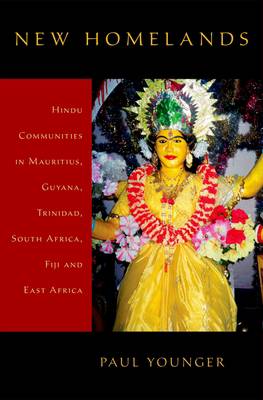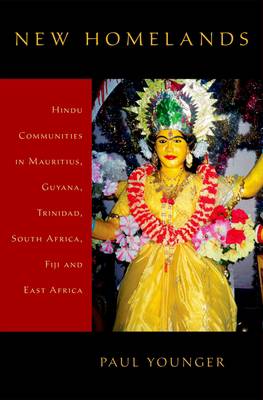
- Retrait gratuit dans votre magasin Club
- 7.000.000 titres dans notre catalogue
- Payer en toute sécurité
- Toujours un magasin près de chez vous
- Retrait gratuit dans votre magasin Club
- 7.000.0000 titres dans notre catalogue
- Payer en toute sécurité
- Toujours un magasin près de chez vous
New Homelands
Hindu Communities in Mauritius, Guyana, Trinidad, South Africa, Fiji, and East Africa
Paul Younger
Livre relié | Anglais
145,45 €
+ 290 points
Description
When the colonial slave trade, and then slavery itself, were abolished early in the 19th century, the British empire brazenly set up a new system of trade using Indian rather than African laborers. The new system of "indentured" labor was supposed to be different from slavery because the indenture, or contract, was written for an initial period of five years and involved fixed wages and some specified conditions of work. From the workers' point of view, the one redeeming feature of the system was that most of their workmates spoke their language and came from the same area of India. Because this allowed them to develop some sense of community, by the end of the initial five years most of the Indian laborers chose to stay in the land to which they had been taken. In time that land became the place in which they joined with others to build a new homeland. In this fieldwork-based study, Paul Younger looks at the present day descendents of these workers and their post-indenture societies in Mauritius, Guyana, Trinidad, South Africa, Fiji, and East Africa. He finds that they still cling to the fact that it was an arbitrary British decision that took them there and made the society pluralistic. This plurality seems to require them to search their memory for a distinctive religious tradition that they can pass on to their children. They know that there was a loss of culture involved in their move to these locations and consider it important to recover from that loss. But they are also intensely proud of their new identity, and insist that they have established a new religious tradition in their new homeland. For generations, says Younger, these people had struggled in their situation and now they had come up with a sense of community and purpose and were prepared to make the historical claim that they had developed an appropriate religious tradition for their specific community.
Spécifications
Parties prenantes
- Auteur(s) :
- Editeur:
Contenu
- Nombre de pages :
- 304
- Langue:
- Anglais
Caractéristiques
- EAN:
- 9780195391640
- Date de parution :
- 30-11-09
- Format:
- Livre relié
- Format numérique:
- Genaaid
- Dimensions :
- 157 mm x 236 mm
- Poids :
- 566 g

Les avis
Nous publions uniquement les avis qui respectent les conditions requises. Consultez nos conditions pour les avis.






